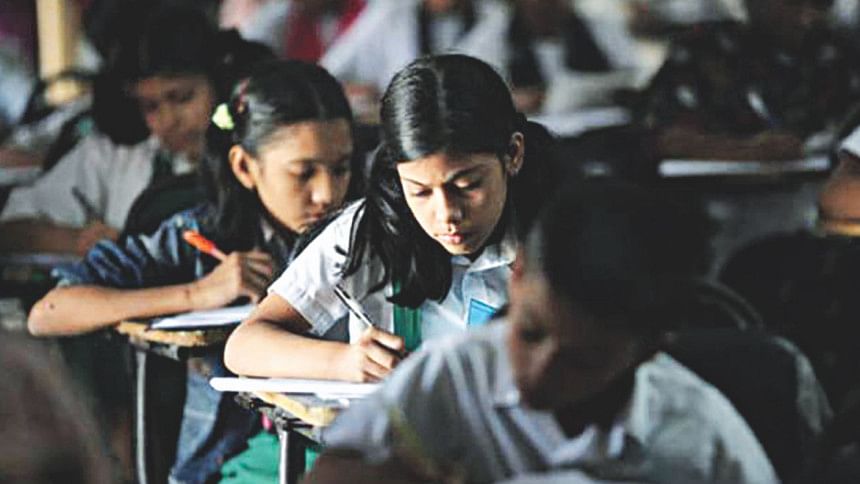Revisiting Vivekananda's philosophy on education

Swami Vivekananda insightfully defined education as "the manifestation of the perfection already in man." Here, "perfection" refers to a range of abilities and talents that exist within us and "manifestation" refers to bringing those out.
According to Vivekananda's philosophy of education, knowledge comes from within as it resides within us and our education system has to be able to discover it. So, it clearly differs from the idea of acquiring knowledge from the outside which is exactly what has been going on in the current education system.
If we take a deeper look at the existing education system in Bangladesh, we would see a rather discouraging scenario because we are not allowing our children to learn independently; instead we are teaching them by mostly feeding chunks of information through a mechanical process. Thus, we are making our children information banks and we believe that the more they can memorise, the more meritorious they are. Vivekananda had said, "Education is not the amount of information that is put into your brain and runs riot there, undigested, all your life." Therefore, education must provide "life-building, man-making and character-making assimilation of ideas."
The four pillars of education, according to Unesco, are: (i) learning to know; (ii) learning to do; (iii) learning to live together; and (iv) learning to be. Learning to know refers broadly to general knowledge on various subject areas as well as lifelong learning. But when you look at our education system, you'll see that this first pillar of education is not what learners are being familiarised with. They are kept away from practical exposure, i.e. to real-life situations, and they thus miss out on experiences that they can then apply and analyse and which they can use to create new knowledge. If we consider Benjamin Bloom's Taxonomy of Educational Objectives (knowledge, comprehension, application, analysis, synthesis and evaluation), we will see that the current education system is mainly limited to knowledge and comprehension (to prepare students for examinations) which is considered as the most crucial for students to get promoted to the next grade. The higher order cognitive skills are kept beyond their reach though our curriculum is meant to be competency-based; we have now introduced "creative questions" which ultimately go in vain as students end up memorising even creative answers beforehand.
Vivekananda has said, "Real education is that which enables one to stand on one's own feet." He strictly holds a view on the practical use of knowledge: "If you have assimilated five ideas and made them your life and character, you have more education than any man who has got by heart a whole library."
Swami Vivekananda is better known as a Hindu Indian monk and little known as an educationist though his philosophy of education is insightful and remains as relevant as ever. Long before Vivekananda put forward his views on education, "blank slate" was a popular term as theorised by John Locke (1632–1704). By this Locke meant that our children are born as blank slates and they then go on to learn behaviours from the environment that they live in. BF Skinner (1904–1990), American psychologist and behaviourist, argued that learning happens through the consequences of both reinforcements and punishments. According to this theory, the more children repeat, the better they learn and it does not make any special distinction between the learning of human beings and that of other animals. Vivekananda, however, without any laboratory experiments, proclaimed, "The external world is simply the suggestion, the occasion, which sets you to study your own mind, but the object of your study is always your own mind."
There remains a struggle to define the role of a teacher. Some sophisticated ideas are unfortunately still only in theory and far from being practised. Lots of efforts have been made to create child-centred classrooms to ensure learners' autonomy and explore the individual potential of each child. Vivekananda clearly defines the teacher's role and that is to remove the impediments to let children grow gradually in their own way. It's like digging soil, watering plants and putting up a fence around to protect the plants from external threats so as to let them grow at their own pace. Vivekananda wanted to see teachers in close interaction with their students: "The only true teacher is he who can immediately come down to the level of the student, and transfer his soul to the student's soul and see through the student's eyes and hear through his ears and understand through his mind. Such a teacher can really teach and none else."
Vivekananda viewed education as the most powerful means of social change that can lead us to self-realisation for being able to offer selfless services. His views couldn't be more fitting for the existing education system. It is vital to perceive education in a more comprehensive manner to guide our future educational reforms and necessary policy change. Extracting lessons from the philosophy of education of Swami Vivekananda would benefit our next generation by making education more meaningful that would make each individual a "complete human being."
Sudeb Kumar Biswas is an education professional working for United Nations in Bangladesh. He serves as an executive member of Vivekananda Study and Cultural Organization, Bangladesh.





Comments